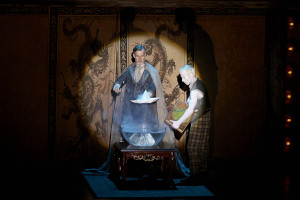Since taking a post as a theatre reviewer with New England Theatre Geek, it’s not very often that I get to see a show without a pen and reviewer notebook in hand. It’s also not very often that I get to see a show with no obligation to come home and write a poignant yet witty review about it. So I find it a wee bit hilarious that the first time I’ve been out to see a show I wasn’t reviewing in some time, I immediately came home with the urge to write about it.
I’ve been waiting for the A.R.T.’s production of The Tempest since they announced their season last year. You heard me correctly; it’s been over a year that I’ve been champing at the bit for a chance to see this show. Last night, the man and I finally made it out to experience the magic and it was well worth the wait.
As a child, I spent a lot of time hanging out with magicians. As a kid, one Saturday a month was devoted to a road trip to the not-so-local local chapter of the Society of Young Magicians. There, myself and a couple of other like-minded individuals (including my brother who was the one who got us all into this mess in the first place) would sit at the knees of local magicians and learn magic tricks. It seemed commonplace to me to come home with playing cards tucked in various surreptitious pockets of my clothing (because it was a favorite game to reverse pick-pocket cards onto other people without them noticing… and actually, a great exercise in prestidigitation for the developing table magician), to look for jackets with giant pockets or loose lining in which more pockets could be sewn, to figure out whether it would be doves or rabbits that were the chosen animal of the house and, thereby, the focus of the next big trick. Eventually, we grew old enough to join the real society and because of this childhood influence, I have a soft spot for magicians and a fascination with magic in general. Despite the fact that I can’t do a card trick to save my life (trust me, I’ve tried), I am a long-standing card-carrying member of the Society of American Magicians.
Magic… plus Shakespeare. It’s a theme that I’ve been turning over in my head for some time. Would one distract from the other? Would people come to see this show just because of its famous producer (Teller of Las Vegas fame)? Would it rub up against all of my traditionalist sensibilities?
Apparently, add some Tom Waits into the mix and you get veritable alchemy.
The show I saw onstage last night was definitive for me in a way that no show has been since I had the opportunity to see the McKellon Lear at the RSC in 2007. The Tempest is a show with problems: music, which is always a challenge since there are no melody notations left from Shakespeare’s songs; long and rambling courtly scenes that if done improperly will just drag on and on and dull your audience into the same slumber that Ariel visits upon the hapless mariners; an ingénue that’s nearly impossible to play; and spirits of all types which appear and disappear seemingly at the whim of the playwright.

Prospero (Tom Nelis) and Ariel (Nate Dendy) conjuring the storm. Photo courtesy of the Smith Center/Geri Kody
I’ve seen good productions of The Tempest before, but they all pale in comparison to what’s onstage at the A.R.T. right now. “Inhuman” gains new meaning, as does “American” representations of England’s playwright laureate.
There’s a sense of danger on Prospero’s island, and magic lurks in every corner. Ariel is ever-present/absent, seen and unseen, all-powerful and completely subjugated. The music is part of the island (literally and figuratively) and comes from a band that looks like it could have bubbled forth from the sea itself. The director was not afraid to cut the text; a necessity to keep the long scenes short and the short scenes pithy. Instead of losing content, this gave the show more room to explore what it clearly set out to do: re-add the “magic” back to this late Romance in a way that I don’t think the stage will see again.
Since my dissertation deals so heavily with American Shakespeare and since that project has taken so much out of me lately, I was exhilarated to be so thrilled by a landmark production right in my backyard. Enchanted by Teller’s tale, I can say with some certainty that this energy was just what I needed to get me through the current busy-times slump.
I wish I could tell you to go see it, but every show is sold out. Standing room tickets are available on the day-of performance at the A.R.T. Box office. The Tempest closes on June 15th, so if any of what I’ve said intrigues you, don’t wait for the storm to pass.

